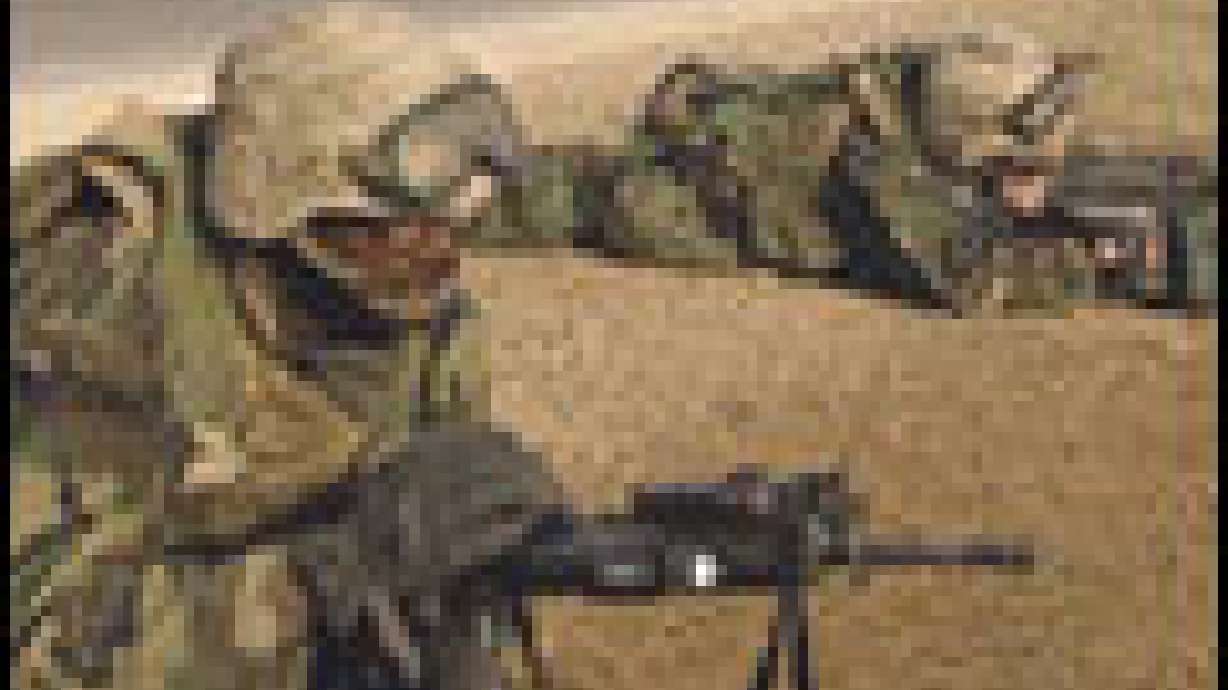Estimated read time: 4-5 minutes
This archived news story is available only for your personal, non-commercial use. Information in the story may be outdated or superseded by additional information. Reading or replaying the story in its archived form does not constitute a republication of the story.
CAMP AS SAYLIYAH, Qatar (AP) -- President Saddam Hussein's government is no longer in control of Baghdad, but coalition forces still face possible combat in some parts of the capital, a U.S. military spokesman said Wednesday.
"The capital city is now one of those areas that has been added to the list of where the regime does not have control," said Brig. Gen. Vincent Brooks. "The regime is in disarray and much of Iraq is free from years of oppression."
U.S. Central Command spokesman Jim Wilkinson said the regime had lost control in "most parts of Iraq," though pockets of regime control remained in the north.
Brooks said Saddam loyalists were holding out in the north, including Saddam's hometown of Tikrit, and still posed a threat, including the possible use of weapons of mass destruction.
British and U.S. aircraft struck military targets in Tikrit on Wednesday, and U.S. troops have tried to block the roads from Baghdad to Tikrit to stop Iraqi leaders from fleeing there.
"We certainly are focused on Tikrit," Brooks said at the U.S. Central Command headquarters in Qatar. "There is still work to be done."
U.S. forces also expect resistance from a mix of Republican Guards and militia fighters in the oil centers of Mosul and Kirkuk, he said.
Noting scenes of celebration in the Iraqi capital, Brooks said there were still some "engagements" in the center of the city around bridges.
"We believe the population recognizes that the end is near (for Saddam's government)," he said.
But he added: "Downtown Baghdad remains a dangerous place. There's still potential for combat action."
In the north, Special Operations troops and Kurdish soldiers seized a small town about 15 miles north of Mosul and captured 200 fighters, Brooks said.
He said there were also attacks on Iraqi positions 20 miles south of Irbil, and that special operations forces supported by aircraft destroyed tanks and cargo trucks there.
In all, coalition forces have taken more than 7,000 Iraqi prisoners of war, he said.
Street celebrations erupted Wednesday in Baghdad, especially in Shiite Muslim neighborhoods, after fighting subsided overnight.
People ripped down pictures of Saddam and looted government buildings of furniture and appliances.
"We certainly have seen areas where the population knows that the regime is gone and will never return again in the way that it has been in the past," Brooks said.
Brooks said the First Marine Expeditionary Force had moved across the Diala River into the southeast corner of Baghdad. Troops also advanced along the west edge of the river into the northeast corner of Baghdad to block roads leading out of the city.
Soldiers also searched the Rashid prison on Baghdad's southeastern edge and found some U.S. uniforms, possibly from American POWs. No bodies were found at the prison.
"We remain concerned about those (POWs) who are remaining unaccounted for, and we hold the regime, whatever remains of it or whoever might have our prisoners of war in possession, accountable and responsible for anything that happens to them at this point," Brooks said.
On the eastern outskirts of Baghdad, troops from Iraq's 10th and 14th Divisions abandoned their weapons and fled ahead of a Marine advance, Brooks said.
U.S. officials warned there were still pockets of resistance in the capital.
"There are still many days of perhaps fierce fighting to follow," said Capt. Frank Thorp, a U.S. Central Command spokesman, adding that U.S. forces in the heart of Baghdad are still running into "sporadic but fierce firefights."
In Karbala, southwest of Baghdad, the 101st Airborne Division found an underground bunker filled with food and anti-aircraft missiles, Brooks said.
Group Capt. Al Lockwood, a British spokesman at Sayliyah, said TV footage of people in Basra showed they were "celebrating liberation" from Saddam's regime.
Lockwood said British troops have contacted local figures and tribal leaders in Basra to deal with looting and preserve property.
He said the British have an obligation under international law to stop the looting.
British troops were in close contact with local leaders but would not reinstall the same leadership that was in place under Saddam, Lockwood said.
"We have asked them (the people of Basra) to chose their own leadership that will take them to the future," he said.
As looting swept through Baghdad, Thorp said U.S. civil affairs troops were there and in other cities to help Iraqis move away from lawlessness and re-establish civil order. However, Brooks said he expected much of the unrest to die down naturally as the euphoria of the regime's collapse wore off.
"We believe that this will settle down in due time. It has already begun to settle down in Basra," he said.
(Copyright 2003 by The Associated Press. All Rights Reserved.)








